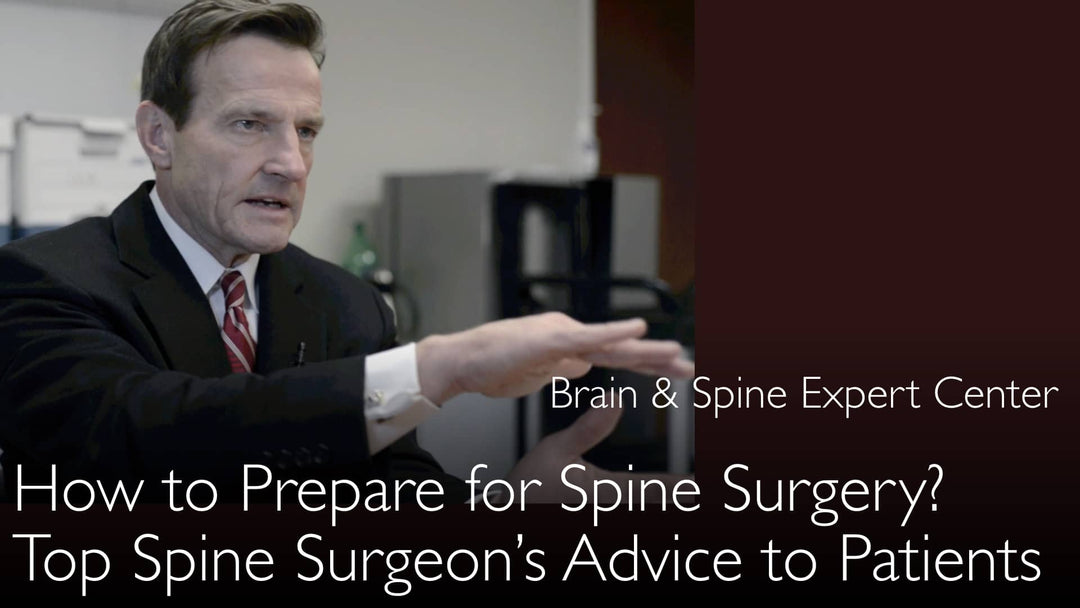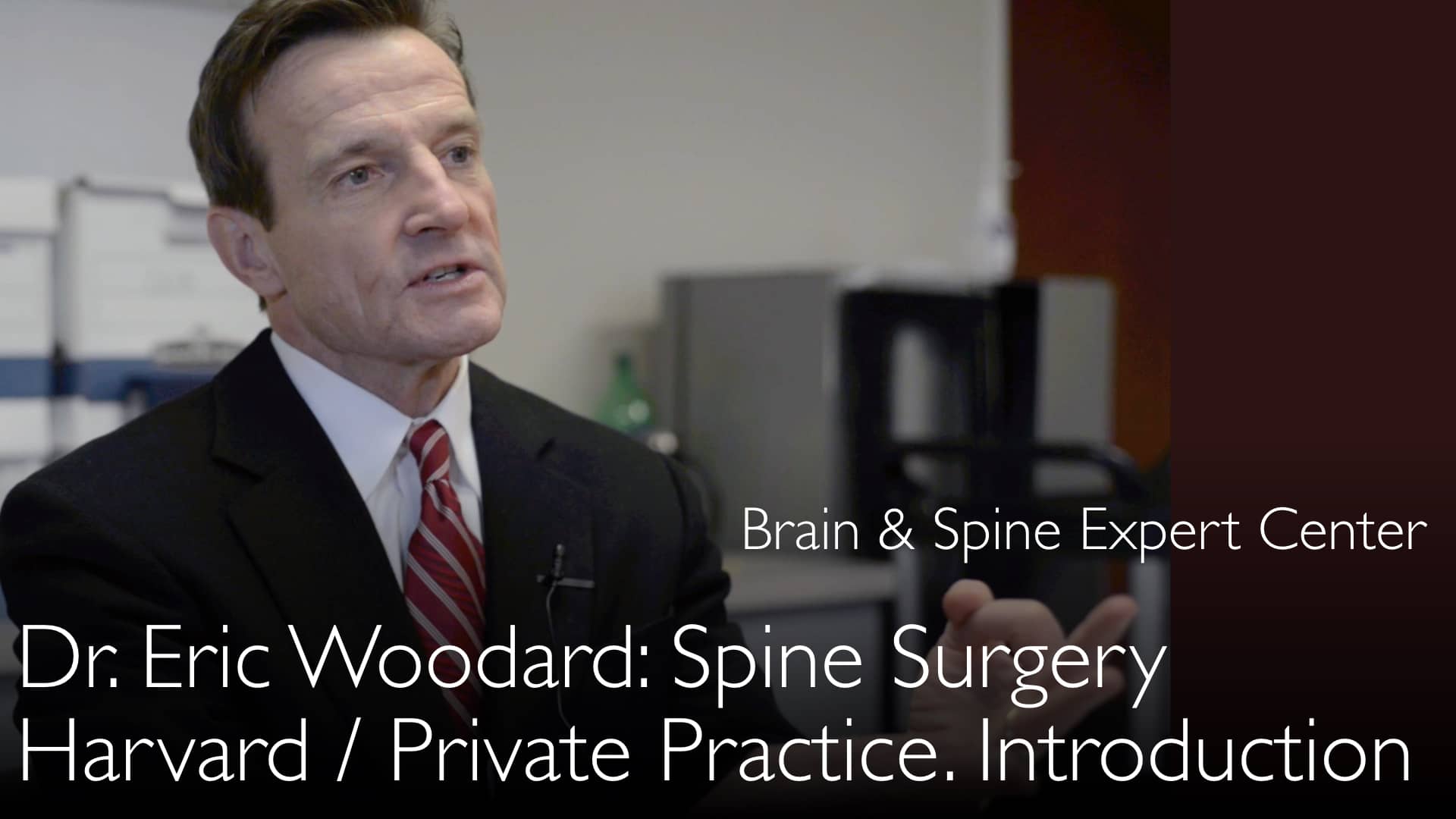O renomado especialista em cirurgia da coluna, Dr. Eric Woodard, explica como se preparar para uma cirurgia na coluna vertebral. Ele ressalta a importância fundamental de buscar uma segunda opinião médica para confirmar o diagnóstico e a necessidade do procedimento. O Dr. Woodard detalha um programa abrangente de orientação pré-operatória, que ajuda a reduzir a ansiedade do paciente. Ele recomenda enfaticamente a fisioterapia antes da cirurgia para aumentar a flexibilidade e a resistência. Além disso, o Dr. Woodard alerta sobre os graves efeitos negativos do tabagismo nos resultados cirúrgicos e na consolidação óssea.
Passos Pré-operatórios Essenciais para o Sucesso da Cirurgia de Coluna
Navegar para a Seção
- Segunda Opinião Médica para Cirurgia de Coluna
- Programa de Educação Pré-operatória para o Paciente
- Preparação Física e Fisioterapia Antes da Cirurgia
- Cessação do Tabagismo Antes da Cirurgia de Coluna
- Modificações do Estilo de Vida para a Cirurgia
- Transcrição Completa
Segunda Opinião Médica para Cirurgia de Coluna
O Dr. Eric Woodard, MD, recomenda enfaticamente buscar uma segunda opinião médica antes de qualquer cirurgia de coluna. Ele orienta que deve haver consenso entre pelo menos dois ou três cirurgiões de coluna experientes e seniores quanto às indicações e ao procedimento planejado. Esse processo confirma que a cirurgia é a escolha adequada e garante que a decisão seja baseada nas condições clínicas e sintomas, e não apenas em achados de exames de imagem, como uma ressonância magnética.
Uma segunda opinião médica proporciona aos pacientes maior confiança no plano de tratamento. O Dr. Eric Woodard, MD, destaca que três elementos-chave devem estar alinhados para que a cirurgia seja a opção correta: os sintomas clínicos do paciente devem corresponder aos achados da ressonância magnética, e deve ter havido falha prévia de tratamentos não cirúrgicos.
Programa de Educação Pré-operatória para o Paciente
O Dr. Eric Woodard, MD, defende um programa robusto de educação pré-operatória para pacientes de cirurgia de coluna. Esse programa, geralmente conduzido pela equipe de enfermagem, abrange anatomia, o procedimento cirúrgico planejado e os instrumentos que serão utilizados. Os pacientes aprendem o que esperar antes, durante e após a cirurgia.
Essa educação abrangente ajuda significativamente a reduzir incertezas e ansiedades relacionadas à cirurgia. Um paciente bem-informado tende a apresentar menos ansiedade, o que pode impactar positivamente o resultado clínico. O Dr. Anton Titov, MD, e o Dr. Woodard concordam que compreender toda a experiência é fundamental para a preparação do paciente.
Preparação Física e Fisioterapia Antes da Cirurgia
O Dr. Eric Woodard, MD, orienta os pacientes a alcançarem a melhor forma física possível antes da cirurgia de coluna. Ele os engaja em fisioterapia pré-operatória para maximizar a flexibilidade e o condicionamento geral. Essa preparação ajuda o corpo a suportar o estresse fisiológico da cirurgia e da recuperação, de modo semelhante ao treinamento para uma competição esportiva.
Melhorar a flexibilidade é especialmente importante. O Dr. Eric Woodard, MD, explica que articulações mais flexíveis facilitam os movimentos após a cirurgia, quando o paciente ainda sente dor. Essa mobilidade aprimorada permite uma participação mais efetiva nos cuidados pós-operatórios e na fisioterapia, resultando em uma recuperação mais tranquila.
Cessação do Tabagismo Antes da Cirurgia de Coluna
O Dr. Eric Woodard, MD, identifica o tabagismo como um fator altamente negativo para os resultados da cirurgia de coluna. A nicotina tem um efeito tóxico específico no osso e prejudica severamente a cicatrização óssea, aumentando significativamente o risco de não união (pseudoartrose), quando a fusão espinal não cicatriza adequadamente. Fumantes também têm um risco basal maior de osteoporose e doença discal degenerativa.
Além da cicatrização óssea, o tabagismo apresenta riscos sistêmicos sérios. Aumenta o risco de eventos cardíacos durante a anestesia e complica a função pulmonar, elevando a chance de pneumonia pós-operatória. O protocolo do Dr. Woodard exige que os pacientes estejam livres de nicotina por pelo menos três meses antes da cirurgia e por seis meses depois, especialmente em procedimentos de fusão espinal.
Modificações do Estilo de Vida para a Cirurgia
Modificações do estilo de vida são um componente crítico da preparação para a cirurgia de coluna. O foco principal está na cessação do tabagismo e na pré-habilitação física. O Dr. Eric Woodard, MD, enfatiza que essas mudanças não são opcionais, mas essenciais para um resultado bem-sucedido. Melhorar a força do core e a resistência geral ajuda os pacientes a suportarem melhor a operação e a reabilitação.
Esses passos proativos contribuem diretamente para uma recuperação mais rápida e menos dolorosa. Ao assumirem o controle de sua saúde antes da cirurgia, os pacientes participam ativamente de seu próprio sucesso. O Dr. Anton Titov, MD, destaca que essa abordagem centrada no paciente é fundamental para a preparação cirúrgica moderna.
Transcrição Completa
Dr. Anton Titov, MD: Como se preparar para cirurgia de coluna? Um cirurgião de coluna líder baseado em Boston compartilha dicas para se preparar para uma operação, não apenas para cirurgia de coluna. Por que uma segunda opinião médica é importante para quem considera se submeter a qualquer tipo de cirurgia? Como se preparar para uma operação se a cirurgia for realmente necessária? Como uma preparação adequada pode melhorar o resultado clínico?
Como se preparar para cirurgia de coluna? Entrevista em vídeo com um especialista líder em cirurgia de coluna. A preparação antes da cirurgia de costas é importante. Você deve obter uma segunda opinião médica para confirmar que a cirurgia é realmente necessária. Saber como se preparar para a cirurgia de coluna é crucial para os pacientes.
Uma segunda opinião médica confirma que o diagnóstico de doença degenerativa da coluna está correto e completo. Também ajuda a escolher o melhor método de tratamento para hérnia de disco ou estenose espinal. Busque uma segunda opinião médica sobre dor nas costas e tenha confiança de que seu tratamento está correto.
O cirurgião deve explicar a cada paciente como se preparar para a cirurgia de coluna. Os pacientes devem aprender tudo sobre o procedimento cirúrgico que farão. Devem perguntar sobre o que acontece antes, durante e após a cirurgia.
Um paciente bem-informado tem menos ansiedade antes de uma operação, o que melhora os resultados clínicos. Preparar-se para uma fusão espinal lombar inclui a cessação do tabagismo. Fumar é um fator muito negativo para os resultados cirúrgicos e tem um efeito tóxico específico na cicatrização óssea.
Coisas essenciais para se preparar para a cirurgia são educação e melhoria da resistência e flexibilidade. O ideal é iniciar fisioterapia antes da cirurgia. Uma boa preparação para a cirurgia de coluna lombar torna a recuperação mais rápida e menos dolorosa. Saber como se preparar para a cirurgia de coluna é um fator crucial para o sucesso do procedimento.
Como se preparar para cirurgia de coluna? Segunda opinião médica para cirurgia de coluna.
Dr. Anton Titov, MD: Falamos muito sobre várias condições que requerem cirurgia espinal. Às vezes, uma operação é necessária. Qual é a melhor maneira de se preparar para a cirurgia espinal?
Dr. Eric Woodard, MD: Primeiro, aprenda o máximo possível sobre a cirurgia. Recomendo fortemente segundas opiniões. Deve haver consenso nas indicações e no procedimento planejado entre pelo menos dois, às vezes até três, cirurgiões de coluna experientes e seniores. Uma segunda opinião médica dá muita confiança de que você está tomando a decisão correta. Isso é primordial.
Dr. Anton Titov, MD: Importantemente, permite que uma pessoa seja tratada com base nas condições clínicas, e não apenas em um achado radiográfico, como você mencionou anteriormente.
Dr. Eric Woodard, MD: Sem dúvida. Os achados radiográficos e da ressonância magnética da coluna devem corresponder aos sintomas clínicos. Mas também deve ter havido falha dos tratamentos não cirúrgicos. Esses três elementos são fundamentais para a decisão de prosseguir com a cirurgia.
Uma vez que você e seu cirurgião, com a segunda opinião médica, concordam que a cirurgia é a melhor opção, a preparação e a educação são primordiais. Por exemplo, aqui temos um programa muito robusto de educação pré-cirúrgica para a coluna. A equipe de enfermagem conduz esse programa de educação do paciente.
Os pacientes aprendem muito sobre a anatomia e o procedimento planejado. Veem alguns dos instrumentos que serão usados em sua coluna. Conversam sobre o que acontecerá antes, durante e após a cirurgia.
Os pacientes aprendem quais serão as expectativas para toda a experiência. Isso contribui muito para aliviar muitas incógnitas e ansiedades associadas a qualquer cirurgia, não apenas à espinal.
Em segundo lugar, outro fator importante que defendemos no pré-operatório é tentar colocar o paciente na melhor forma possível. Às vezes, eles podem até superar expectativas. Claro, há limitações, já que a razão para a cirurgia de coluna é tipicamente dor ou fraqueza.
Mas se você pensar no que acontece fisiologicamente com o corpo durante a cirurgia e na recuperação, é similar a um evento esportivo ou a correr uma maratona.
Dr. Anton Titov, MD: Você tem que se preparar.
Dr. Eric Woodard, MD: Eu tento engajar meus pacientes em fisioterapia no pré-operatório. Isso ajuda a maximizar sua flexibilidade e condicionamento, permitindo que passem pela cirurgia da melhor maneira possível.
Dr. Anton Titov, MD: Que tipo de modificações do estilo de vida você recomenda aos seus pacientes antes e após a cirurgia?
Dr. Eric Woodard, MD: Antes da cirurgia, como eu disse, a flexibilidade é provavelmente mais importante. Todos gostamos de um core forte, uma região abdominal robusta. Mas a flexibilidade pode contribuir muito para facilitar o movimento depois da cirurgia, quando há dor.
Às vezes, articulações mais flexíveis facilitam a capacidade de movimento após a operação, ajudando na participação mais efetiva nos cuidados pós-operatórios.
Dr. Anton Titov, MD: Há um grande problema com pacientes fumantes, especialmente homens na faixa etária e demografia que podem requerer cirurgia de coluna. Fumar afeta negativamente muitos processos fisiológicos e a reparação tecidual. Como o tabagismo impacta o processo de cirurgia de coluna?
Dr. Eric Woodard, MD: Absolutamente. Fumar, em várias frentes, é um desafio real. É um fator negativo significativo para os resultados clínicos. Primeiro, há os aspectos fisiológicos negativos do tabagismo. Fumar coloca você em alto risco de doença cardíaca e de eventos cardíacos durante a anestesia.
Fumar torna a anestesia mais difícil devido aos efeitos diretos nos pulmões. Aumenta as secreções e o risco de pneumonia pós-operatória. Mas a nicotina tem um efeito tóxico muito específico no osso e na cicatrização óssea.
Pessoas que fumam tipicamente têm um grau maior de artrite ou doença discal degenerativa desde o início. Fumar causa doença degenerativa da coluna. Em segundo lugar, fumantes claramente têm um risco maior de perda mineral óssea.
Fumar leva a osteopenia e osteoporose, especialmente na coluna cervical em mulheres. Outro grande problema com a nicotina é seu efeito negativo na capacidade de formar osso novo. Quando fundimos a coluna, a falha da fusão, chamada não união (pseudoartrose), é significativamente maior em pessoas que usam produtos com nicotina.
Dr. Anton Titov, MD: Pacientes não deveriam fumar em geral, mas, em particular, deveriam parar antes de qualquer tipo de cirurgia de coluna.
Dr. Eric Woodard, MD: Solicitamos que os pacientes estejam livres de nicotina por pelo menos três meses antes da cirurgia da coluna vertebral. Também pedimos que evitem fumar por pelo menos seis meses após o procedimento, especialmente se realizarmos uma cirurgia de fusão espinhal.
Dr. Anton Titov, MD: Como se preparar para a cirurgia da coluna vertebral? Entrevista em vídeo com um especialista líder em cirurgia da coluna. Por que uma segunda opinião médica é importante? Como recuperar-se mais rapidamente após a cirurgia?





